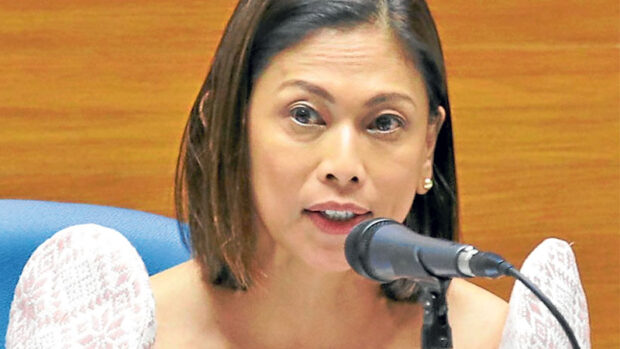OVP secret funds spent in 11, not 19, days – Quimbo

Marikina City Rep. Stella Luz Quimbo (File photo from the Facebook page of the House of Representatives)
MANILA, Philippines — The P125 million in confidential funds allotted to the Office of the Vice President (OVP) in 2022 was spent in a shorter period than previously assumed — in 11 days, not 19 as earlier flagged by a Marikina City Rep. Stella Quimbo.
Quimbo, senior vice chairperson of the House Committee on Appropriations, disclosed that detail on Monday, as she also called for mandatory reports on the transfer of confidential and intelligence funds (CIFs) between government agencies.
“The truth is, I was surprised when I read the news that the amount was spent in just 19 days. I asked the COA and I checked different reports. But this was not spent in 19 days, but 11 days,” she said at the House plenary’s deliberations on House Bill No. 8980 or the proposed 2024 General Appropriations Act.
Quimbo was referring to ACT Teachers Rep. France Castro’s assertion in August, citing documents from the Department of Budget and Management (DBM), that the P125 million disbursed by the Office of the President (OP) to the OVP was spent in 19 days.
Acting as sponsor of the proposed P13.36-billion budget for the Commission on Audit (COA), Quimbo said the commission would complete its report on that disbursement by Nov. 15.
Article continues after this advertisement‘Reward payments’
Quimbo was responding to questions raised at the House plenary by Gabriela Rep. Arlene Brosas who, visibly shocked, remarked that it was “hard to think that the amount was used for surveillance” in just 11 days.
Article continues after this advertisement“How many reward payments would that be at P11 million per day?” wondered the lawmaker, a member of the Makabayan bloc.
Quimbo said the OVP submitted on Jan. 17 a liquidation report on the P125 million which the COA was still auditing.
“This morning, the COA gave its preliminary observations to the Office of the Vice President. It means that they issued an audit observation memorandum already,” she said.
Reached for comment, OVP spokesperson Reynold Munsayac said that his office had yet to receive such a memorandum from the COA.
In a statement following the plenary session, Brosas said Duterte’s 11-day “spending spree” of confidential funds would mean that the Vice President spent an average of P11,363,636.36 per day.
“For VP Sara to fully utilize P125 million in 11 days, she needs to pay 1,250 informers at P100,000 each for 11 days or P9,090 daily per informer,” Brosas said.
The budgets of both the OP and OVP will be tackled in Tuesday’s plenary session.
Mandatory reporting
Also at Monday’s plenary session, Quimbo called for the mandatory reporting and other stringent criteria on the transfer of CIFs.
“There should be a reportorial requirement for any transfers of confidential funds as well as intelligence funds within agencies… I believe that this may be happening, at the moment, but these are not reported to Congress,” she said.
Albay Rep. Edcel Lagman argued, however, that “there should be no transfer of confidential and intelligence funds from one agency to another.”
Quimbo offered other suggestions to Congress. saying: “I believe that there should be possible amendments [on] the question of who may be entitled to confidential and intelligence funds, particularly for the national government agencies,” she said, adding that the DBM “can impose a stricter set of criteria [with regard to] government-owned and -controlled corporations.”
Lagman suggested limiting CIFs to “appropriate agencies, consistent with their mandate.”
“[W]ithout prejudicing national security, the public must have access to [information on] the utilization of confidential and intelligence funds,” he said.
‘No penalty’
The opposition lawmaker also noted Quimbo’s observation that there were no penalties or sanctions on agencies failing to comply with reportorial requirements on CIFs.
“Then the errant goes scot-free under the present system? I do not need an answer to that because it is obvious since there is no penalty,” Lagman said.
Quimbo said that under Joint Circular No. 2015-01 of both the DBM and the COA, 68 percent of government agencies had complied with mandatory reporting in 2021. Compliance in 2022 was higher at 81 percent.
The circular limits the use of confidential funds for surveillance and intelligence, supported by documents on those expenditures, and does not include compensation, allowance, consultancy fees, and representation and entertainment expenses.
She said five agencies submitted liquidation reports in 2022, but these are still subject to verification.
These agencies are the Anti-Money Laundering Council (AMLC), Games and Amusement Board, Department of Finance, Office of the Presidential Adviser on the Peace Process, and Philippine Drug Enforcement Agency.
But in 2021, the AMLC was the only agency with “zero compliance, meaning no submission whatsoever,” Quimbo said.
Lagman said: “But it’s now 2023. Why is it that there is such a delay in the compliance of these agencies having CIF? Don’t you think that there should be an amendment… that compliance… be made [within] one year of the disbursement of the funds?”
Quimbo replied: “We can condition releases on compliance.”
She also proposed the creation of a special oversight committee, noting that the COA’s Intelligence and Confidential Fund Audit Office is undermanned.
The special House committee, she said, could be composed of the House speaker, three majority members, and one minority member.